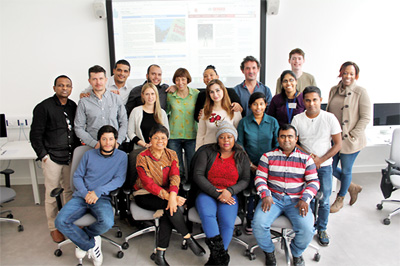News
Controlling tobacco epidemic – Sri Lanka in the lead
Sri Lanka has become a formidable force in battling the insidious campaigns of the tobacco industry on all fronts – locally, regionally and globally.

The CCT team, together with teams from the tobacco observatories in Brazil and South Africa, who received training in tobacco industry research and monitoring at the University of Bath, United Kingdom.
The South Asian Regional Consortium Centre for Combating Tobacco (SARC-CCT) will be inaugurated tomorrow (July 15) at the Galle Face Hotel, Colombo, amidst a distinguished gathering of delegates from Sri Lanka and the region.
The Chief Guest at the launch will be the Vice Chancellor of the Colombo University, Prof. Chandrika Wijeyaratne and the Guest-of-Honour, the Chairman of the National Authority on Tobacco and Alcohol (NATA), Dr. Palitha Abeykoon.
A simultaneous capacity building workshop which includes technical sessions by global and regional experts in tobacco control will be held at the Amora Lagoon Hotel in Katunayake from July 15 to 17.
Before SARC-CCT there was already CCT (Centre for Combating Tobacco), rising from within the Faculty of Medicine, University of Colombo in collaboration with The International Union Against Tuberculosis and Lung Disease simply referred to as The Union.
Reiterating that Sri Lanka is playing a leadership role in tobacco monitoring and control, the Director of the CCT, Dr. Mahesh Rajasuriya said that it is good for the country.
“Everyone is watching closely to see the impact of SARC-CCT on regional tobacco control,” said Dr. Rajasuriya who is a Consultant Psychiatrist and Senior Lecturer at the Department of Psychiatry, Colombo Medical Faculty.
The CCT is the coordinating body of SARC-CCT which is an eight-member regional consortium linking Sri Lanka, Afghanistan, Bhutan, Bangladesh, India, Maldives, Nepal and Pakistan.
With tobacco being a major public health issue across the world, Dr. Rajasuriya says that the CCT and SARC-CCT will monitor the tobacco industry and its allies including politicians, government officials, academics et al.
“We pore over, in fact surf the internet, and scrutinize all the information in the public domain on tobacco including the annual reports of tobacco companies and put out this research as peer-reviewed, scientifically verified evidence. This evidence which is investigative and in perspective, we disseminate on the web portal: tobaccounmasked.lk.
Explaining that SARC-CCT would be the South Asian ‘tobacco observatory’ or the tobacco industry monitoring centre, he says that the CCT or the Sri Lankan tobacco observatory was established in 2016 under Article 5.3 of the Framework Convention on Tobacco Control (FCTC) of the World Health Organization (WHO).
“The FCTC is the world’s first modern-day global public health treaty and the first negotiated under the auspices of the WHO. It entered into force in February 2005 and has been signed by 168 of the 192 WHO member states. More than 180 WHO member states have become parties to the FCTC,” says Dr. Rajasuriya.
The FCTC provides an internationally coordinated response to combating the tobacco epidemic, it is learnt, and sets out specific steps to governments on how to address tobacco use.
These steps include: Adopting tax and price measures to reduce tobacco consumption;Banning tobacco advertising, promotion and sponsorship;Creating smoke-free work and public spaces;Putting prominent health warnings on tobacco packages;Combating illicit trade in tobacco products.
Article 5.3 of the FCTC is categorical that when setting and implementing public health policies with respect to tobacco control, the Parties to the FCTC should act to protect these policies from commercial and other vested interests of the tobacco industry in accordance with national law.
It is to support this that ‘Knowledge Hubs’ and observatories of the FCTC Secretariat are located across the world.
Dr. Rajasuriya explains that the seven Knowledge Hubs, with at least one in each of the WHO regions, are tasked with analyzing, synthesizing and disseminating to all those who are parties to the FCTC, knowledge and information on tobacco.
These Knowledge Hubs are global in the scope of their work which goes beyond the boundaries of the hosting countries, sub-regions and regions. The first on ‘Legal Challenges’ was established in Melbourne, Australia in 2014.
The Knowledge Hub on ‘Surveillance’ is in Helsinki, Finland; on ‘Smokeless Tobacco’ in Noida, India; on ‘Water Pipes’ in Beirut, Lebanon; on ‘Taxation’ in Cape Town, South Africa; on ‘International Cooperation’ in Montevideo, Uruguay; on ‘Article 5.3’ in Bangkok, Thailand.
The tobacco observatories are in Colombo, Sri Lanka; Rio de Janeiro, Brazil; and Pretoria, South Africa.
The CCT is located down Park Road in Colombo 5.
| Eminent international faculty at workshop | |
| The international faculty which will conduct the capacity building workshop includes eminent members from the FCTC Knowledge Hub on Article 5.3 in Thailand; the Tobacco Control Research Group, University of Bath, United Kingdom; the Centre for Tobacco Control Research and Education, University of California, San Francisco, United States of America (USA); and the Tobacco Observatories in Brazil and South Africa. The faculty will also include members from The Union from the US and South Asia. The Union, according to its website, is an influential network of members, including over 850 staff based in 10 offices and 25,000 rural healthcare providers, 15,000 community volunteers and thousands of partner organizations worldwide. “We are a global scientific organisation with the mission to improve health among people living in poverty,” it states, adding that its work directly supports the Sustainable Development Goals (SGDs) – a universal set of goals to end poverty, protect the planet and ensure prosperity for all – of the United Nations. While the workshop is one component, another will be a six-week training programme for representatives or their juniors from the other seven countries of SARC-CCT. During this time, not only will they ‘learn the trade’ so to say, about how to carry out the work with regard to collecting information on the tobacco industry but also get to know each other, Dr. Mahesh Rajasuriya added. |

